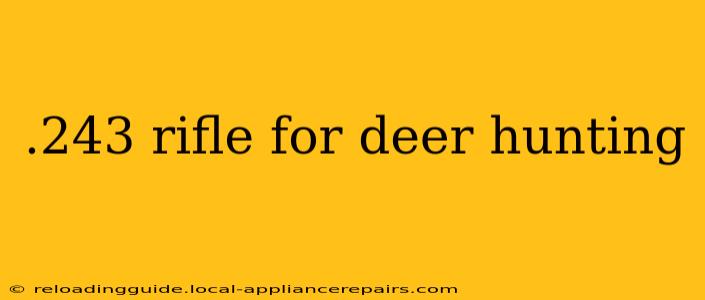The .243 Winchester, known for its accuracy and manageable recoil, is a popular choice among deer hunters. This comprehensive guide delves into the suitability of the .243 for deer hunting, exploring its advantages, limitations, and best practices to ensure a successful and ethical hunt.
Is the .243 Winchester Right for Deer Hunting?
The short answer is: yes, for many deer hunting scenarios, the .243 Winchester is an excellent choice. Its flatter trajectory compared to larger calibers makes it ideal for longer shots, while its manageable recoil allows for quicker follow-up shots and improved accuracy, especially for less experienced hunters. However, its effectiveness depends heavily on shot placement and the size of the deer being hunted.
Advantages of Using a .243 for Deer:
- Flat Trajectory: The .243's relatively flat trajectory means less bullet drop at longer ranges, increasing your effective shooting distance. This is crucial in open terrain where deer might be further away.
- Manageable Recoil: The lower recoil makes it easier to shoot accurately, especially for newer hunters or those with less upper body strength. This leads to better shot placement and a more enjoyable hunting experience.
- Variety of Ammunition: A wide range of ammunition is available, including various bullet weights and designs, allowing hunters to tailor their load to specific hunting situations and deer size.
- Accuracy: Known for its inherent accuracy, the .243 allows for precise shots, maximizing the chances of a clean kill.
- Lightweight: The lighter recoil and overall weight of the rifle contribute to reduced fatigue during extended hunts.
Limitations of the .243 for Deer Hunting:
- Energy at Longer Ranges: While its trajectory is flat, the .243's energy decreases at longer ranges compared to larger calibers. This is particularly important for ethical harvesting, as sufficient energy is needed for a clean kill.
- Not Ideal for Larger Deer: While suitable for whitetail deer and other similarly sized game, the .243 might not be powerful enough for consistently taking down larger deer species, particularly at longer ranges. Shot placement becomes even more critical in these instances.
- Bullet Selection is Crucial: Choosing the right bullet weight and design is essential for optimal performance. Selecting a bullet that expands reliably at deer hunting ranges is paramount.
Choosing the Right Ammunition for .243 Deer Hunting
The ammunition you choose significantly impacts the effectiveness of your hunt. Consider these factors:
- Bullet Weight: Bullet weights typically range from 80 to 100 grains. Heavier bullets generally retain more energy at longer ranges.
- Bullet Construction: Look for bullets designed for controlled expansion, ensuring sufficient energy transfer for a clean kill. Popular choices include bonded, partition, or controlled-expansion bullets.
- Ballistic Coefficient: A higher ballistic coefficient means the bullet is less affected by wind and gravity, improving accuracy at longer ranges.
Best Practices for .243 Deer Hunting:
- Practice Regularly: Accuracy is key. Spend ample time at the range practicing your shooting skills with your chosen ammunition.
- Know Your Range: Understand your rifle's capabilities and limitations at various distances.
- Proper Shot Placement: Focus on vital shot placement for a quick and ethical harvest. Aim for the heart and lungs.
- Ethical Hunting Practices: Always follow ethical hunting guidelines and respect wildlife.
Conclusion:
The .243 Winchester is a versatile and effective cartridge for deer hunting, particularly for those who prioritize accuracy, manageable recoil, and a flatter trajectory. While it might not be the ideal choice for all hunting situations or deer sizes, its capabilities make it a strong contender for many hunters. Remember that responsible gun ownership, ethical hunting practices, and careful ammunition selection are crucial for a successful and ethical hunt. Always prioritize safety and responsible hunting practices.

